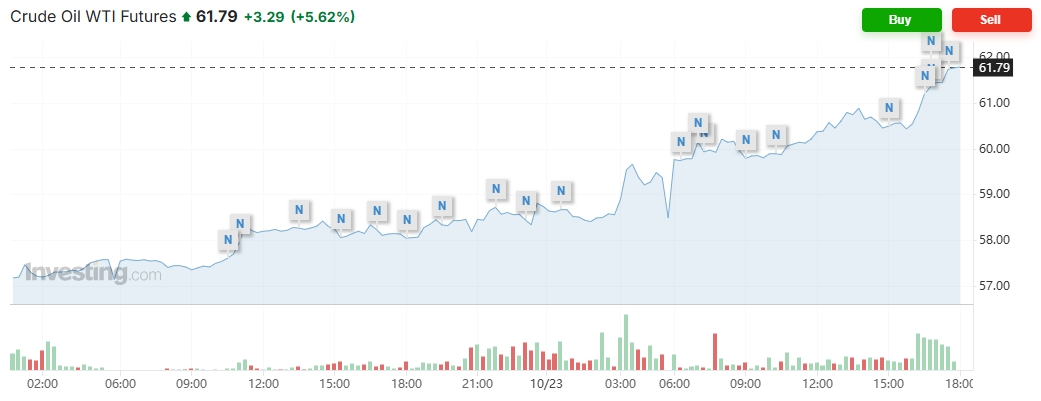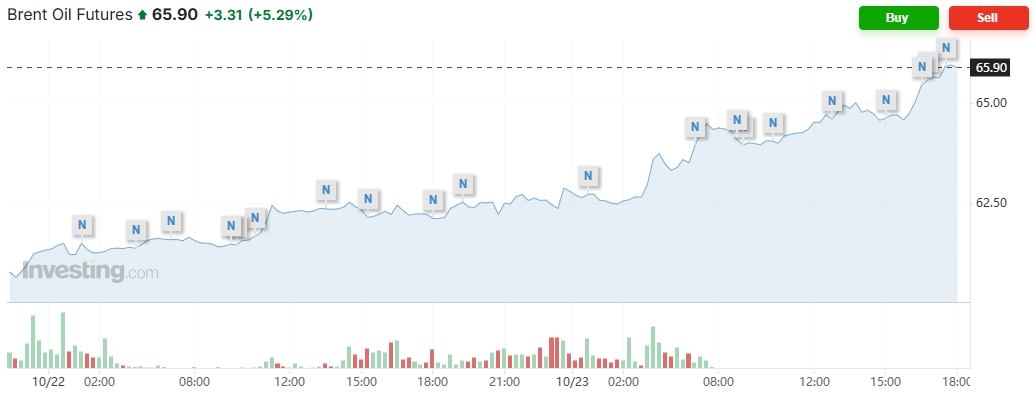Trump’s Policy Reversal on Russia: Sanctions on 2 Major Oil Firms Propel Crude Over 5%
TradingKey - On Wednesday, Eastern Time, the Trump administration announced new sanctions on Russia's two largest oil companies, aiming to pressure Russia into peace negotiations regarding Ukraine. This marks the first instance of direct economic pressure by the Trump administration on Russia concerning the Russia-Ukraine conflict.
Concerns over potential disruptions in Russian oil supplies led to Brent and WTI crude futures rising over 5% by press time on Wednesday.

WTI crude oil futures price chart, source: investing.com

Brent crude oil futures price chart, source: investing.com
The cancellation of a planned meeting between the US and Russian leaders on Tuesday, with President Trump citing fundamental disagreements over ceasefire issues, set the stage for these new US sanctions against Russia.
US Treasury Secretary Scott Bessent stated that the sanctions target Rosneft and Lukoil, with the US prepared for further actions. A deadline of November 21 has been set for the winding down of business, allowing companies nearly a month to finalize or terminate existing transactions with these Russian oil firms.
Bloomberg estimates indicate that these two companies account for nearly 50% of Russia's total crude oil exports. With the inclusion of these firms on the sanctions list, all of Russia's top four oil giants are now under US sanctions.
Last week, the UK imposed similar sanctions on these companies. On Wednesday, the EU formally adopted its 19th round of sanctions against Russia, including a ban on Russian liquefied natural gas entering the European market starting in 2027.
These sanctions signify a 180-degree shift in Trump's policy towards Russia, as he had previously delayed imposing sanctions and announced a meeting with Putin just last week.
Analysts believe the core aim of these sanctions is to weaken Russia's financial flows. Bessent remarked that these oil companies fund Russia's "war machine."
However, the effectiveness of the sanctions remains uncertain. Thomas Graham, a senior fellow at the Council on Foreign Relations, noted that the impact might fall short of Trump's expectations. The Biden administration had enacted several rounds of sanctions following the Russia-Ukraine conflict's outbreak in 2022, severely impacting the Russian economy but failing to halt the war's progression.
Warren Patterson, head of commodities strategy at ING Groep NV in Singapore, expressed doubts about the sanctions' actual impact on exports.
Reports indicate that Indian refineries, major buyers of Russian oil, are scrutinizing their Russian oil trade documents to ensure compliance with the latest sanctions against the two companies.
Emma Li, an oil market analyst at Vortexa, suggested that India might need to abandon its long-term shipping agreements. Energy experts point out that India would have to primarily rely on US and OPEC crude supplies. Kpler senior crude analyst Muyu Xu believes that while Russian oil flows will not cease entirely, short-term disruptions are inevitable.






